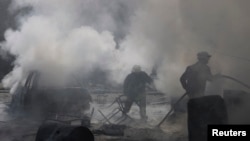The United Nations Commission of Inquiry on Syria is calling for the establishment of an ad hoc tribunal to bring alleged perpetrators of war crimes and crimes against humanity in Syria to account.
The commission has detailed gross and widespread human rights violations in Syria as the country enters its fifth year of conflict.
The four-member Commission of Inquiry says a culture of impunity is flourishing in Syria.
It says those who continue to commit violations of international law have nothing to fear, as it appears they are unlikely to be held accountable for their actions.
Since it was established in August 2011, the commission has repeatedly called on the U.N. Security Council to refer alleged perpetrators of war crimes in Syria to the International Criminal Court. Such action has been blocked by a threatened veto from Russia, which backs Syrian President Bashar al-Assad.
Faced with this reality, commission member Karen AbuZayd told VOA the hope of bringing cases to the ICC is no longer there. She said the commission is proposing alternative ways of bringing perpetrators of atrocities to justice.
“When you say have we given up hope about the ICC, one reason why we are suggesting other things like ad hoc tribunal, universal jurisdiction, national jurisdiction is because that would be a substitute for the ICC.
"If we cannot get these things through the ICC, which would also be the case for the ad hoc tribunal, then we hope that somewhere other places that we could get through the government to do that," said AbuZayd.
Alternative solutions include having the General Assembly, which is not subject to a veto by the five nuclear powers, refer cases to the ICC. The General Assembly also could set up an ad hoc tribunal.
Commission Chairman Paulo Pinheiro said such a tribunal would focus only on Syrian cases, unlike the ICC, which deals with cases arising in many countries.
“Ad hoc tribunals dedicated to a particular conflict are able to bring many more individuals to prosecution ... An ad hoc tribunal could be based in the region closer to victims where justice could be done and be seen by affected communities. And, finally, as we said recently in terms of cost, it would be minimal when compared to the actual cost of war," said Pinheiro.
The U.N. Commission has a list of alleged Syrian war crime perpetrators, but investigators say they will not make the list public now.
They say the best way to pursue justice is through targeted disclosure.
But they note they will share names and information about specific alleged perpetrators with state prosecution authorities preparing to bring cases that fall under their national or universal jurisdiction.
Cases that fall under national jurisdiction are likely to concern foreign fighters who return to their home countries and can be caught under local laws, but universal jurisdiction is much broader and extends beyond foreign fighters.




